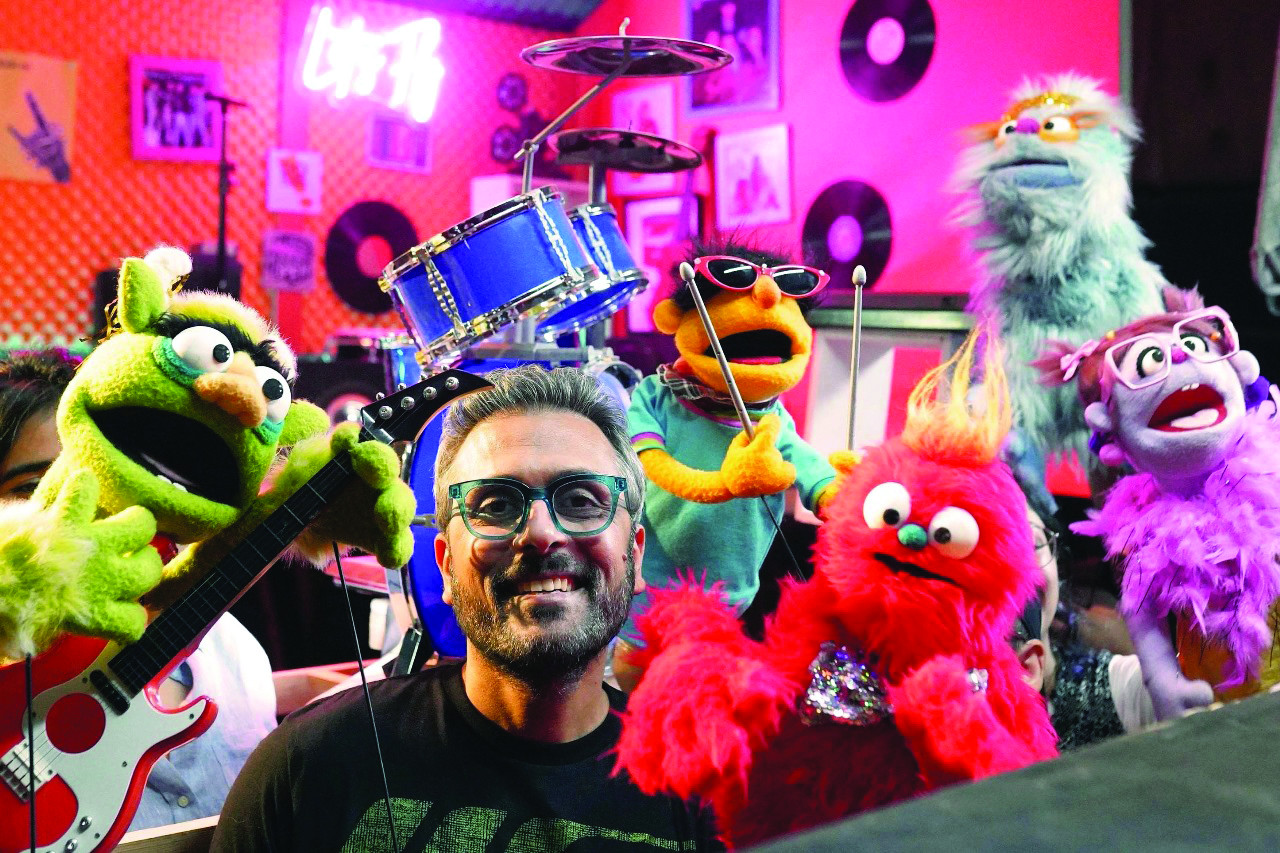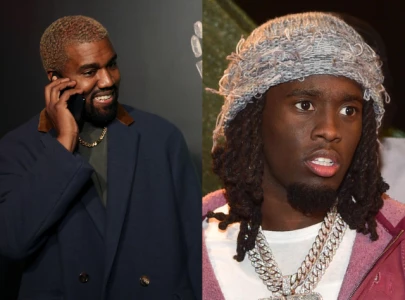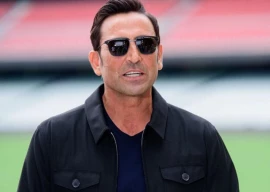
If you were to chart Bilal Maqsood's trajectory in Pakistani music, it would map the soundtracks of a generation. As one half of the pop rock band Strings (with Faisal Kapadia), he helped define a collective sense of longing, nostalgia, and the complexities of love, drawing millions to his plaintive guitar riffs and poetic lyricism. However, in recent years, his artistic journey has veered into unexpected terrain.
When I meet Bilal at his studio, it is not hard to believe that he is the pen and mind behind the comic shenanigans of his puppet show, Pakkay Dost. There's an air of quiet intent to the space: softly flickering scented candles, a workspace meticulously arranged, and Bilal himself, casually ensconced in thick-rimmed glasses, calm and comfortable, worlds away from the chaotic energy of the vinyl-strewn, popcorn-scented realm of Mera Bichraa Yaar I have always associated him with.
"Strings was a romantic band. Our songs were mostly about love. Now making a song like that feels very superficial to me," he reflects, leaning forward, his words measured, speaking of a transformation years in the making. Bilal tells me of a Strings fan he met recently who declared his transition to puppetry and kids' entertainment a "fall from grace." A sentiment, no doubt, shared by many fans of a band lucky enough to inspire inexhaustible nostalgia. But Bilal has moved on.
"This, right now, is fulfilling a much bigger purpose. It makes me really, really happy. Maybe this is what I was looking for all my life. Mothers come to me with their little kids and they say, 'This uncle made Pakkay Dost' and I feel happy. I have a new fanbase in the making, one whose height is just about two feet," he shares.
A 'khandaani' humour
Premiering in September 2023, the first episode of Pakkay Dost introduces Miraal, a purple know-it-all with whimsical wisdom, and Mateen, blue and not so smart. Trying to fix his umbrella, Mateen takes up Miraal's offer to embrace the rain prompting the two to break into the witty "Jab baarish ziada aati hai / Tau pani ziada aata hai."
"If you watch two Pakkay Dost episodes in one go, you will observe that it has a certain type of humour. I can't put it in brackets," Bilal remarks, the hint of a smile tugging at his lips. "In my family, we are all very funny people. Pakkay Dost's style of humour is my family's post-dinner humour."
Bajjo, the green monster, draws inspiration from Bilal's beloved aunt and playwright, Fatima Surayya Bajia, and is brought to life by his niece, Alizeh, who has been imitating Bajia since her childhood. Mateen, the blue character, is modelled after Bilal's mother's kitchen help and voiced by Umer Adil, the show's director. Bajjo and Mateen are joined by Lal Baig, Tufail, Jagga, and Miraal.
It's this unmistakable warmth, the same humour that has resonated in his family for years, that gives Pakkay Dost its heart. The show doesn't speak down to its young audience. Instead, it treats them as equals - full of curiosity and insight, deserving of a world that has little interest in preaching.
"My vision was to create high-quality content for kids because we don't have that here. When people saw Pakkay Dost, they immediately caught on to it. I have been getting amazing feedback from teachers and parents, who tell me the kids love it. I get pictures on Instagram of kids having a Pakkay Dost-themed birthday. They get screenshots from the show blown out to make cutouts for the cake and all. Slowly and gradually the craze is getting to this age group that wants Pakkay Dost-themed events, merchandise and all," Bilal explains.
Growing up with 'Sesame Street'
His voice is warm, suffused with the sincerity that one might expect from someone who has fully embraced a new path. As much as it is about kids, the singer's affinity for the show is rooted in something far deeper than entertainment and its tricky accomplices - fame and profit. "My intention was never to look for views and likes. I just wanted to do this because growing up Sesame Street inspired me a lot. I wanted to recreate Sesame Street in a way that was culturally relevant to us."
He adds, "The core target audience is aged 3-7. Not 8. When kids turn 8, their interests start to change. They want more action-oriented content."
An Urdu-language puppet show is not a novel concept in Pakistan. The 1970s saw PTV's widely cherished Kaliyan and its iconic Uncle Sargam. This is a history Bilal is intimately familiar with, turning this project into a labour of love and passion. "I have wanted to work on this for the last 25 years. I never got the time for it back in the days of Strings. But the next day after we called it quits, I began working on Pakkay Dost."
If there's any bewilderment for those who revere his musical career, it dissolves the moment he speaks about his love for puppeteering. "I think I have found my life's purpose now. I want to make every child's childhood memorable and wholesome."
Accessibility, season 3, and more
"When I first began, the goal was simple: to create quality Urdu content for children. But as I went on, I realised there was so much more I could do. I started to think beyond just producing content. I wanted to make every child's childhood unforgettable, to create something that didn't just entertain but also had an impact," Bilal reflects, his voice imbued with the kind of introspection that reveals how deeply he's thought about his mission.
He continues, "If you look at a lot of Pakistani kids' cartoons, you'll see they are often rooted in religion, and they garner millions of views. That wasn't the kind of show I wanted to make. I wanted something that spoke to every child in Pakistan, regardless of their religion. In Pakkay Dost, there's no content designed specifically for Muslims - because my focus was always on diversity."
The show's thoughtful approach to diversity was a conscious choice from the start. But as the singer's vision for inclusivity deepened, so did his sense of responsibility to ensure Pakkay Dost was accessible to all. "Then ConnectHear reached out to collaborate, and it felt like the obvious next step. I knew this was the direction I needed to take. To make this content accessible to an audience that often gets overlooked."
A new version of Pakkay Dost season came out on January 28 with all episodes integrating Pakistan Sign Language, an endeavour that took about two months. Going forward, fans can expect sign language to be a regular feature of every episode.
Looking forward, Pakkay Dost fans can anticipate thrilling developments. According to Bilal, season three begins shooting in April. He announces, "There is a surprise coming. A celebrity woman, liked by many people, will join our puppet characters as a human neighbor. We cannot reveal her name right now. Another twist is that instead of separate songs, every episode will have a storyline with conflict, resolution, and themes."
























COMMENTS
Comments are moderated and generally will be posted if they are on-topic and not abusive.
For more information, please see our Comments FAQ